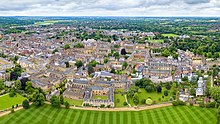Campus


A campus is by tradition the land on which a college or university and related institutional buildings are situated. Usually a college campus includes libraries, lecture halls, residence halls, student centers or dining halls, and park-like settings.
A modern campus is a collection of buildings and grounds that belong to a given institution, either academic or non-academic. Examples include the Googleplex and Apple Park.
Etymology
[edit]The word derives from a Latin word for "field" and was first used to describe the large field adjacent Nassau Hall of the College of New Jersey (now Princeton University) in 1774.[2] The field separated Princeton from the small nearby town.
Some other American colleges later adopted the word to describe individual fields at their own institutions, but "campus" did not yet describe the whole university property. A school might have one space called a campus, another called a field, and still another called a yard.
History
[edit]The tradition of a campus began with the medieval European universities where the students and teachers lived and worked together in a cloistered environment.[3] The notion of the importance of the setting to academic life later migrated to America, and early colonial educational institutions were based on the Scottish and English collegiate system.[3]
The campus evolved from the cloistered model in Europe to a diverse set of independent styles in the United States. Early colonial colleges were all built in proprietary styles, with some contained in single buildings, such as the campus of Princeton University or arranged in a version of the cloister reflecting American values, such as Harvard's.[4] Both the campus designs and the architecture of colleges throughout the country have evolved in response to trends in the broader world,[5][6] with most representing several different contemporary and historical styles and arrangements.
Uses
[edit]
The meaning expanded to include the whole university institutional property during the 20th century, with the old meaning persisting into the 1950s in some places.
Office buildings
[edit]
In the early 1990s the term began to be used to describe a company's office building complex, most notably when Apple's Infinite Loop campus was first built, which at the time was exclusively for research and development. The Microsoft Campus in Redmond, Washington, is another example of this usage, although it was built in the 1980s, before the term was applied to company property. In the 21st century, hospitals and even airports[7] sometimes use the term to describe the territory of their respective facilities.
Universities
[edit]
The word campus has also been applied to European universities, although some such institutions (in particular, "ancient" universities such as Bologna, Padua, Oxford and Cambridge) are characterized by ownership of individual buildings in university town-like urban settings rather than sprawling park-like lawns in which buildings are placed.
See also
[edit]- Campus novel
- Campus university
- History of college campuses and architecture in the United States
- Satellite campus
References
[edit]- ^ Turner, Paul V. (1996). Joseph Ramée: International Architect of the Revolutionary Era. Cambridge: Cambridge University Press. p. 190.
- ^ Harper, Douglas. "Campus (n.)". Online Etymology Dictionary. Retrieved 20 December 2013.
- ^ a b Chapman, M. Perry (2006). American Places: In Search of the Twenty-first Century Campus. Greenwood Publishing Group. p. 7. ISBN 9780275985233.
- ^ Turner, Paul Venable (1984). Campus: An American Planning Tradition. Cambridge, Massachusetts: The MIT Press.
- ^ [1]. Campus from 1600. Retrieved 10 April 2022.
- ^ [2]. Modern day campus. Retrieved 10 April 2022.
- ^ "Fraport and NTT to Build Europe's Largest Private 5G Network at Frankfurt Airport".
